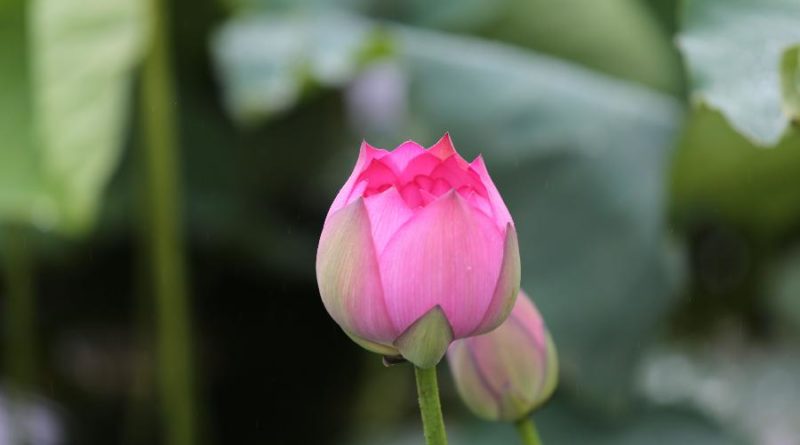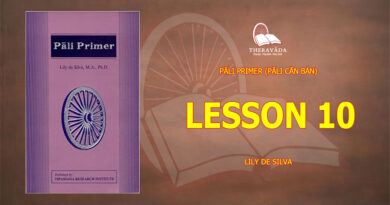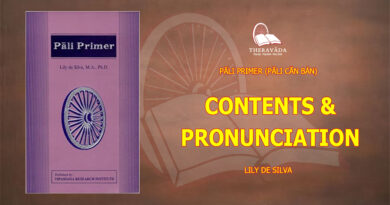Lesson 20
1. Declension of Feminine Nouns ending in -i
Bhūmi = earth, ground
| Singular | Plural | |
| Nom. | bhūmi | bhūmī, bhūmiyo |
| Voc. | bhūmi | bhūmī, bhūmiyo |
| Acc. | bhūmiṃ | bhūmī, bhūmiyo |
| Ins. | bhūmiyā | bhūmīhi, (bhūmībhi) |
| Abl. | bhūmiyā | bhūmīhi, (bhūmībhi) |
| Dat. | bhūmiyā | bhūmīnaṃ |
| Gen. | bhūmiyā | bhūmīnaṃ |
| Loc. | bhūmiyā, bhūmiyaṃ | bhūmīsu |
Feminine nouns ending in -ī are also similarly declined with the only exception being the nominative and vocative singular which end in-ī.
2. Vocabulary
Feminine nouns ending in -i
| aṅguli | – finger |
| aṭavi | – forest |
| ratti | – night |
| doṇi | – boat |
| yuvati | – maiden |
| yaṭṭhi | – walking stick |
| asani | – thunderbolt |
| nāḷi | – unit of measure |
| rasmi | – ray |
| iddhi | – psychic power |
| sammajjani | – broom |
Feminine nouns ending in -ī
| nadī | – river |
| nārī / itthī | – woman |
| taruṇī | – young woman |
| bhaginī | – sister |
| vāpī | – tank |
| pokkharaṇī | – pond |
| kadalī | – banana |
| brāhmaṇī | – brahmin woman |
| gāvī | – cow |
| rājinī / devī | – queen |
| kumārī | – girl |
3. Verbs
| vyākaroti | – explains |
| pattheti | – aspires |
| vissajjeti | – spends |
| āroceti | – informs |
| muñcati | – releases |
| nīhareti | – takes out |
| peseti | – sends |
| paṭiccādeti | – conceals |
| veṭheti | – wraps |
| viheṭheti | – harasses |
Exercise 20
4. Translate into English:
1. Bhūpālo rājiniyā saddhiṃ nāvāya nadiṃ taranto udake carante macche olokento amaccehi saddhiṃ katheti.
2. Pāniyaṃ pivitvā dārikāya bhūmiyaṃ nikkhitto patto bhinno hoti.
3. Kassakānaṃ gāviyo aṭaviyaṃ āhiṇḍitvā khettaṃ āgamiṃsu.
4. Rattiyā samuddasmiṃ patitā candassa rasmiyo oloketvā taruṇiyo modiṃsu.
5. Upāsakā iddhiyā ākāse gacchantaṃ tāpasaṃ disvā pasannā honti.
6. Bhaginiyā saddhiṃ pokkharaṇiyā tīre (bank) ṭhatva so padumāni ocinituṃ vāyami.
7. Nāriyo vāpīsu nahāyituṃ vā (or) vatthāni dhovituṃ vā na icchiṃsu.
8. Yuvatiyā puṭṭhaṃ pañhaṃ vyākātuṃ asakkonto ahaṃ tāya (with her) saddhiṃ sallapituṃ ārabhiṃ.
9. Asappurisassa puttena kataṃ pāpakammaṃ paṭicchādetuṃ ammā na ussahi.
10. Bhaginiyā dussena veṭhetvā mañcasmiṃ ṭhapitaṃ bhaṇḍaṃ itthī mañjūsāyaṃ pakkhipi.
11. Mā tumhe magge sayantaṃ kukkuraṃ viheṭhetha.
12. Sappuriso amacco dhanaṃ vissajjetvā yācakānaṃ vasituṃ sālāyo gāmesu karitvā bhūpālaṃ ārocesi.
13. Kumāro suvaṃ hatthamhā muñcitvā taṃ uḍḍentaṃ passamāno rodanto rukkhamūle aṭṭhāsi.
14. Saddhāya dānaṃ dadamānā kusalaṃ karontā sappurisā puna(again) manussaloke uppajjituṃ patthenti.
15. Kumāro mañjūsaṃ vivaritvā sāṭakaṃ nīharitvā ammāya pesesi.
5. Translate into Pāli:
1. There are lotuses and fishes in ponds in the king’s park.
2. The young women picked lotuses from the tank and kept them on the ground.
3. The queen spoke with her sisters who came having crossed the river by boat.
4. I saw the dog chasing the cow in the field.
5. Women and girls did not climb trees to pick fruits and flowers.
6. You (pl.) went to the river to bathe and got frightened hearing the peal of thunder (asanisaddaṃ).
7. You (pl.) do not conceal the evil committed with your friends.
8. If you spent money to buy clothes, inform your mother.
9. Send the lotuses wrapped in lotus leaves to the young girls seated in the hall.
10. We can explain the questions asked by the women in the assembly.
-ooOoo-







